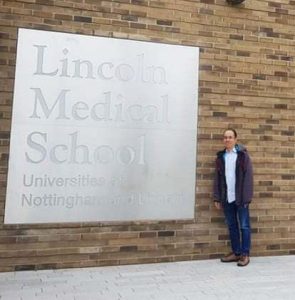 Almost seven years, over 62,000 words, 313 pages, 10 chapters, 546 references, two publications, a transfer viva, and a full viva later, my PhD journey has ended. The thesis comprised three different elements: the systematic scoping review; paramedic interview study and the patient interview study. There was also a shadowing exercise with paramedics.
Almost seven years, over 62,000 words, 313 pages, 10 chapters, 546 references, two publications, a transfer viva, and a full viva later, my PhD journey has ended. The thesis comprised three different elements: the systematic scoping review; paramedic interview study and the patient interview study. There was also a shadowing exercise with paramedics.
In the systematic scoping review, the initial search produced almost 6,000 publications. A two-stage filtering process reduced this to 13. The main themes were: access and use of healthcare services; expectations and understanding of the healthcare system; medical travel; language barriers and communication problems; and social networks. The systematic scoping review was published in BMC Health Services Research in March 2020.The thesis explored these themes further in interviews with 15 ambulance staff and 12 Eastern European patients. All staff interviews were conducted face-to-face and one-to-one. By contrast, some patient interviews were conducted face-to-face, some involved an interpreter, and others involved couples. Because of COVID-19, the final three patient interviews were undertaken by telephone, with one involving an interpreter.
Staff and patients generally challenged the negative media stereotyping of Eastern Europeans. They also agreed that the ambulance service and Eastern European patients needed a closer relationship to ensure that resources were being used effectively. While staff encountered more foreign medication due to medical travel, which complicated how they delivered prehospital care, patients used it to overcome perceived problems with the NHS, including long waiting times, perceived low staff competency, etc. The staff and patient interview studies were published in the Journal of Migration and Health in September 2022.
I am grateful to the support from my supervisors, Niro Siriwardena and Zahid Asghar from the Community and Health Research Unit (CaHRU), as well as Sundari Anitha from the School of Social and Political Sciences.
